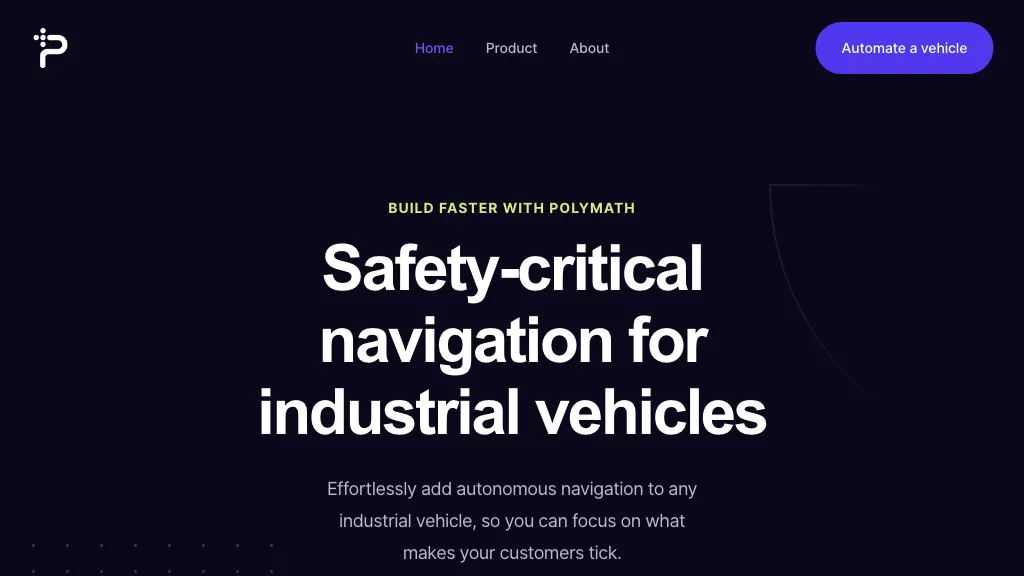What is Polymath Robotics?
Polymath Robotics is a comprehensive AI solution for the automation of industrial vehicles. It remains the only platform offering class-leading safety-critical navigation in scenarios with uncomplicated autonomy that can be further tailored for custom applications. Of importance, the technology is vehicle-agnostic—it supports an extremely wide range of sensors and it can be controlled via API. The company behind it also offers interested parties a no-cost test simulation instance.
Polymath Robotics: Key Features & Benefits
Polymath Robotics encompasses several features and benefits that help it stand apart for users across all industries. Some of its key features include:
- Industrial vehicle automation
- Safety-critical navigation
- Effortless Autonomy
- Custom Configurations
- Compatibility with a variety of sensors
These, in turn, provide a number of advantages, such as greatly improved operation efficiency, a decrease in human error, and the ability to tailor the system to fit specific operational needs. The vehicle-agnostic aspect of the platform acts as an added bonus: there can be zero issues with integrations that may already exist.
Use Cases and Applications of Polymath Robotics
Polymath Robotics can be applied in a variety of different industries and use cases. Some of the most prominent ones would include:
- Automating warehouse vehicles
- Autonomous farming equipment
- Automated construction machinery
Some industries that can utilize Polymath Robotics are logistics, manufacturing, agriculture, and construction. For example, it will be useful for the automation of forklifts by warehouse managers and the deployment of autonomous tractors by farmers. The construction company will also be able to operate heavy machinery with the use of this software.
How to Use Polymath Robotics
The usage of Polymath Robotics is pretty straightforward, owing to the fact that most users follow these steps:
- Hardware setup and sensor installation on the vehicle
- System setup via the Polymath API.
- This will run simulations on the free instance available.
- Deploy the real-world system.
For best performance, however, best practices include periodic updating of the system, testing of the system in a simulated environment before any real-world deployment, and continuous monitoring of performances of the systems.
How Polymath Robotics Works
It deals with working advanced AI algorithms and models for robust and reliable navigation. The systems use a variety of sensors that collect data, further processing, and enable highly accurate control of the vehicle. Its workflow usually includes data collection, processing, decision-making, and execution—all in sequence to seamlessly automate tasks.
Pros and Cons of Polymath Robotics
While Polymath Robotics has much to offer, here are both the pros and some possible cons:
Pros
- Highly automated
- Safety features at a high level
- Flexible with custom configurations
- Sensor compatibility
Possible Cons
- Setup costs
- Technical expertise necessary for configuration
User Reviews
Most users point out that the system is effective, fast, and very reliable. However, a few users reported that at the beginning of setting up this system, it takes time to learn it. Therefore, it has a learning curve that is steep.
Conclusion about Polymath Robotics
In a nutshell, the platform of Polymath Robotics is really capable and adaptable for industrial vehicle automation development. Based on the key features, including safety-critical navigation and a number of supported sensors, the platform could be close to your friend in many industries. Although there are setting-up challenges in the above, the positive factors weigh heavier than the adverse ones. Later, continuous updates and advancement in AI will definitely upgrade its functionalities.
Polymath Robotics FAQs
What type of vehicles can be automated by Polymath Robotics?
Polymath Robotics is vehicle-agnostic, and thus able to automate any type of industrial vehicle—from a warehouse forklift to a farming tractor.
Do you have a free trial?
Yes, here at Polymath Robotics we do have free simulation instances where users can test our capabilities prior to buying.
What kind of technical expertise would one need to get started with Polymath Robotics?
While the system is designed to be user-friendly, some technical expertise in the configuration of sensors and the use of APIs will be useful for the best setup and operation.
Can Polymath Robotics be integrated with existing systems?
Yes, it can easily integrate with a host of sensors and seamlessly integrate into existing systems.










